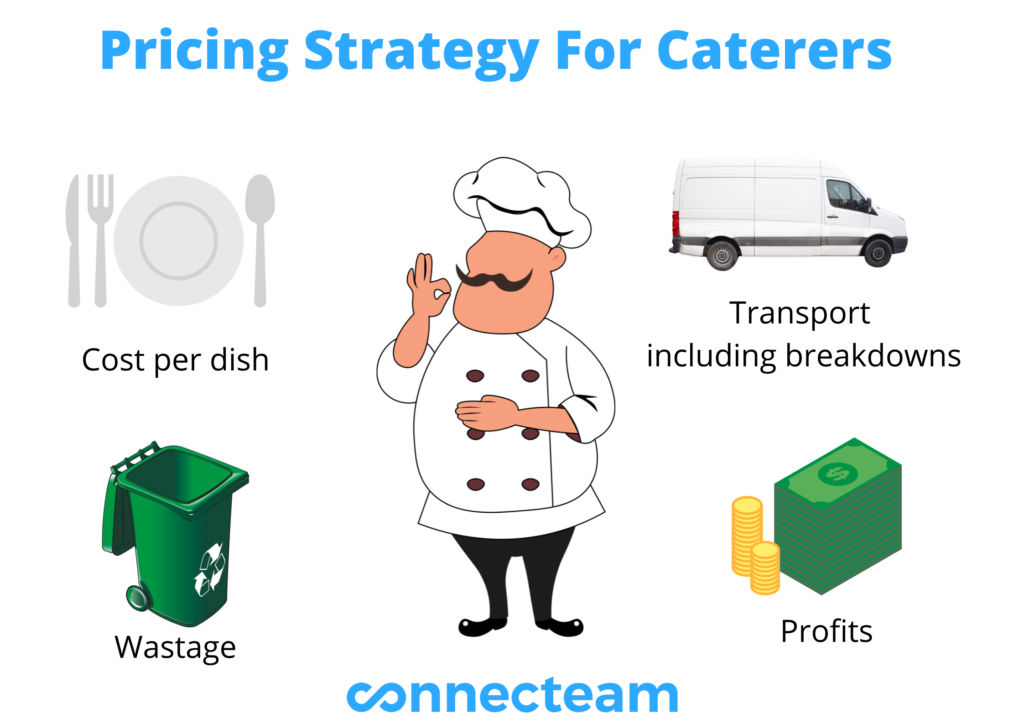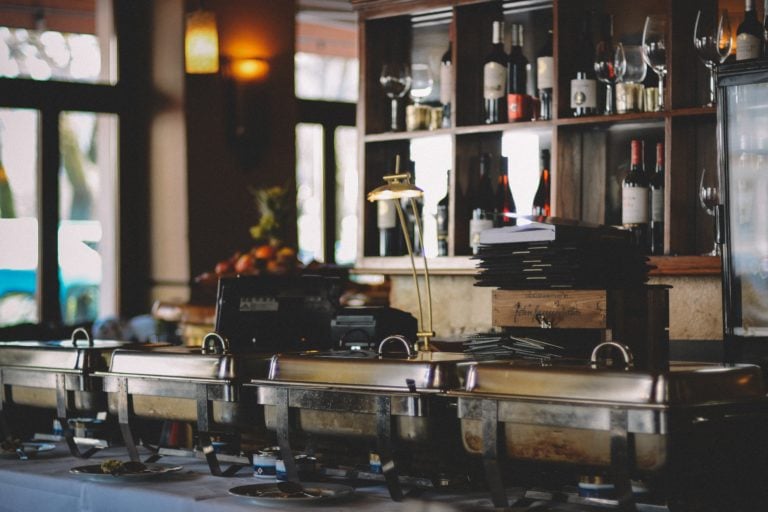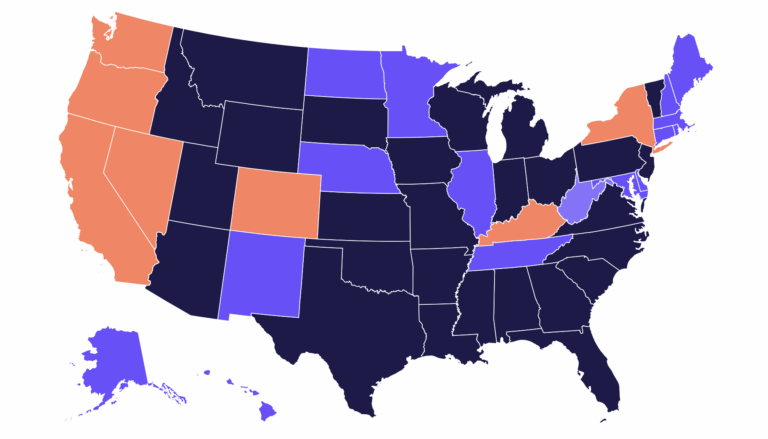We’ve gone into the kitchen to find out what makes a good caterer. We share the right recipe to start your catering business on the right foot with 10 easy tips.
Are you a foodie? Enjoy cooking? Or love hosting dinner parties?
Good news!
If you’ve been itching to start your own catering business, whether as a “Plan B” or a full-time gig, the time has never been more perfect.
This market is worth a whopping 15.4B, and market trends show that the catering industry is projected to increase by 8% in 2021 alone.
It’s continued to drive the market, so the time to start your own catering business has never made more sense!
If you’re now asking yourself how to start a catering business? Then read the tips outlined below because we’ve put our aprons on to provide you with the answers you’ve been looking for!
Do The Research
You need to know exactly what kind of catering business you want to open.
Most caterers will specialize in a single type of food, like cakes and pastries, whereas the other half offers many services, such as floral arrangements, a champagne fountain, and more.
So whether you choose to focus on a single catering type or multiple, make sure you’ve done your homework! This is so that you know what is feasible and what you can offer potential clients:
- Lunch or brunch foods like sandwiches and salads are great during business luncheons, school functions, etc.
- Wedding reception
- Special event meals like a graduation or Sweet 16
- Desserts like cookies, cakes, etc.
- Appetizers and cocktails
The above really fall into three main categories: business clients, social events, and cultural events. Getting your research out of the way clears the path for success!
Set Your Pricing
Now that you know which category you will focus your culinary skills on, it’s time to consider your pricing strategy.

Your price will depend mainly on where you’re located and what catering options you will offer. Many businesses offer a level of service based on the customer’s budget. Some caterers offer a strategy starting with Bronze through to Platinum.
Also, keep an eye out for your competitors and find out how much they charge. This will help you gauge and provide your pricing boundaries.
You also need to sit and work out your overheads, lighting, fridges, marketing, etc. Once you have done so, you can work out your profit margin, pricing strategy, and so on.
When setting up your pricing, be sure to cover the unexpected costs, such as:
- Buying extra dishes
- Having to throw out food
- Gas for vans
- etc.
Obtain Licences & Permits
Once you’ve completed the first two steps of how to start a catering business, you have to know if you are operating as a home-based or commercial caterer. As most states will only license one or the other.
Most places require a business license and possibly a catering license or permit so that you can prepare and sell food. This does mean that you will have a health inspector pop in to ensure you’re meeting all of the state and local requirements for commercial food preparation.
Additionally, if you’re selling alcohol then you need a separate alcohol permit.
It can be helpful to contact your Small Business Development Center so they can fully explain how you get a catering license in your area. In addition, they will be able to provide you with pricing costs.
If you want to take your catering business to a whole other level then consider culinary school training – sure, it isn’t required, but it can give you a leg up over the competition.
Or you can gain a certificate from the National Association for Catering and Events.
Choose a Business Structure
Your next step when sorting out how to open a catering business is to choose a business structure. This is key as it will affect how much you’re taxed and if you can get sued by a dissatisfied customer.
There are three options available:
- A sole proprietorship, which is easy to create. You just need to use your own name and social security number. All business expenses are deducted through your personal tax return.
- An LLC (Limited Liability Company), which can have two or more owners. An LLC also protects the owners from personal lawsuits.
- An S Corporation, which is a form of incorporation that is similar to an LLC, but offers some tax advantages and extra paperwork.
It is wise to consult your legal team to make the best choice for your catering business.
Locate a Suitable Cooking Space
Whether you’re thinking about using your home or renting or even buying your own place (maybe you’ll own a food truck), research has to be done before a decision is made. In fact, this decision should be at the top of your mind when looking at how to open a catering business.
If you’re worried about costs and think your own home is a suitable place, there are a few things to consider.
- For starters, your home will need to pass an inspection so being up to date with all health and safety standards is a must.
- In addition, do you have space to store multiple ingredients and prepare food for 100+ people? Be sure to check your state and local laws.
- Other laws include having the health inspector come round, storing food at the right temperature, etc.
Really consider the space you have and go from there.
Most commercial kitchens and commissaries are commercial kitchens so they are already licensed as a place to prepare and store food. If your home doesn’t have a fully-loaded chef’s kitchen then look at renting a commercial kitchen to get started.
Lastly, sometimes restaurants in your local area are open to renting out their kitchen space after business hours so be sure to call a few and see what’s possible.
Get All Equipment
Just like with the location of your cooking space, you need to consider whether you’re going to rent or buy all your own equipment.
You are going to need utensils, silverware, plates, bowls, cups, and so on. And don’t forget warming trays, big pots, and sternos. Sites like Amazon and eBay can work wonders when needing to buy small items in bulk.
Also, you need an account for storage for all your catering equipment. Especially if your catering business is in your home. If you don’t have room, or just don’t want to clutter your own garage, then look at renting a small storage unit.
We recommended that you weigh up costs when it comes to renting and buying all your own equipment. Consider that you might go through dozens of pots and pans every year. Renting such equipment for each gig can add up.
There is no right or wrong answer here, make the best choice for yourself and your business.
Use The Right Tools
It is vital that you streamline daily processes to ensure customer satisfaction and efficiency when it comes to your catering business. This is why many catering professionals turn to catering business software as their business grows.
Early on, it can be helpful to use a free catering software solution (like Connecteam) and then upgrade to a paid plan when your business has boomed.
What is catering business software exactly? Catering business software is designed to help your catering business run smoother so that you can avoid organizational problems and challenges most commonly associated with your industry. Such as inefficient training, poor management, high turnover, scheduling discrepancies, and so on.
As such, many catering companies turn to Connecteam catering business software to manage their day-to-day operations. From robust features to affordable pricing plans, Connecteam is a no-brainer. The most popular features include:
- Quick and easy scheduling, from planning to distribution, for all the different employee roles and events. Each shift includes all key information such as time, address, and special instructions, allow employees to accept and reject shifts, and more.
- Use an employee hour tracker to track employee hours with GPS, send automatic reminders to make sure caterers are clocking in and out on time, process vacation and sick day requests, view and export timesheets using Connecteam’s integration with QuickBooks Online, and more.
- Easily onboard new hires by ensuring all policies and operational processes are available on their smartphone.
- Train your team for different event types with easy access to a knowledge base with your catering dishes, or how tables and food should be organized, and so on.
- Keep everyone on the same page by creating event-specific communication with chat groups and send updates for company announcements and employee motivation. Share GIFs, videos and pictures, start a live poll and create surveys.
- Create checklists for event preparation, collect information about the event (broken dishes, food ratings, event pictures, etc.), and more.
- Easily manage preparation for events with built-in reminders for your team to execute tasks, where you receive automatic updates in real-time on task completion. Create event tags and delegate tasks for each responsible party.
Connecteam – All-In-One Catering App
Schedule, track time, message, fill out digital checklists, forms, and so much more even while on the go!
Create a Menu
One of the most fun steps when considering how to start a catering business is creating your menu and then testing your own dishes!
When creating your menu, follow these steps to ensure variety:
- Offer a variety of options to suit different tastes like spicy and non-spicy options. Even if you only specialize in a specific cuisine, ensure that your menu will appeal to multiple tastebuds.
- Offer vegetarian and vegan options.
- Ensure your menu has manageable sizes, especially with food that you’re skilled in cooking as it’s made with ingredients you can easily obtain.
Test Your Dishes.
Now that you have a menu, host a party with friends and family to test the menu! Just make sure they’re brutally honest about the food. Based on their feedback, make changes to the menu and dishes to ensure it appeals to potential customers.
Plus, practice really does make a difference. So work on smoothing out your cooking techniques, cooking times, and even presentation.
Hire Your Team
Unless you’re catering a party of fewer than 10 people or you have superhuman powers, the chances of catering an event all by yourself are slim.
You may need to hire and train a catering team. However, this might not make any sense for you (especially as your business grows) but is something to consider if it comes up.
Review job sites specifically made for food services, research how your competitors landed their staff, and go by word of mouth by looking at your own network.
Ensure that you’re asking the right questions during the hiring process, after all, your catering business is only as good as your menu and the people who work for you.
Keep Extra Capital
As the catering business relies on sell-by dates and cooking to perfection, it’s vital you set money aside in case something goes wrong. Remember, you are working with raw products, so if something burns or doesn’t taste right you have to start again.
And if you haven’t budgeted well, you could run into trouble.
Extra money allows you to prepare for the unexpected. If you have a venue booked and your client decides to add another ten people, and now you have to go out and buy ten extra dish sets, you have the money to do so. If your van breaks down, you have money to fix it. If the price of gas increases, then you have the money to do so.
All of the above is why your pricing is so important.
Market Yourself Well
No matter how good an event is, what’s on everybody’s mind is the food. So, keep in mind that your next client could come from your next event.
When you serve excellent food, the guests will be asking the host how much they paid? Were there several options to choose from?
Remember to always be on your A-game, and you could very well be booking more events. Ask the host if you may leave business cards or other marketing materials on the table to gain more business. If done tastefully, then hosts won’t usually mind.
Wrapping Up How to Start a Catering Business
By following the tips we outlined above on how to start a catering business, you can avoid common mistakes when starting your own catering business. It is so important to do your research before you hit the ground running. Be sure you’ve set your pricing up well so you can avoid going into the red.
Always ensure you’re following the latest marketing trends as well, this allows you to stay ahead of the competition. In addition, using the right digital tools can set your business apart, and keep you at number one!
Join Thousands Who Trust Connecteam
Caterers love Connecteam for its quick scheduling, accurate time clock, simple communication, digital paperwork, and so much more!




